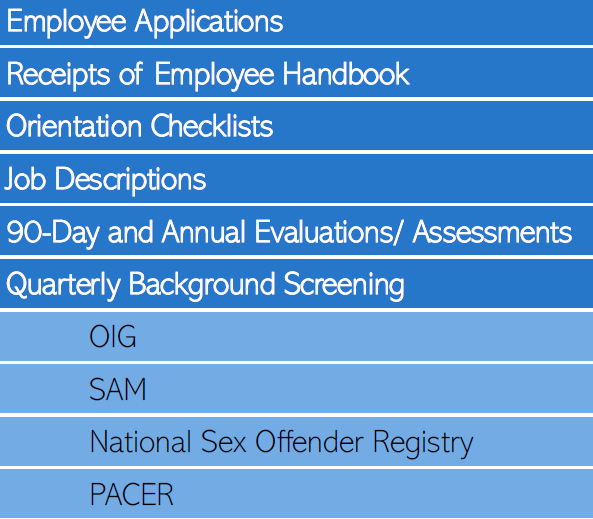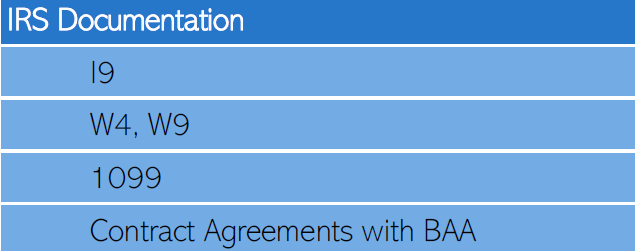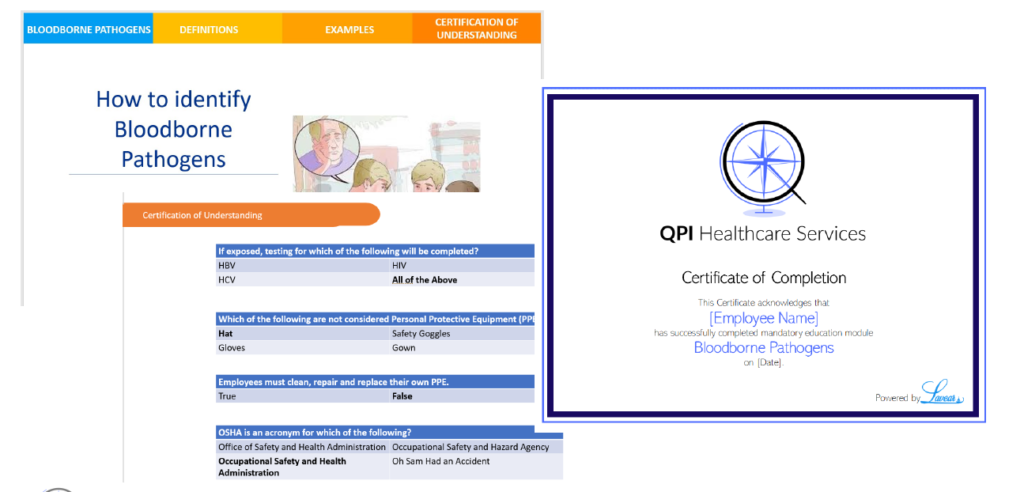Human Resources - DME Accreditation Requirements
The importance of maintaining a complete and accurate employee file is just as critical as managing your organization’s corporate records. For Durable Medical Equipment (DME) providers, proper HR file documentation is not only a best practice—it’s a core component of DME compliance, enforced by Medicare, Medicaid, and your DME accreditation organization.
Each employee file must contain documentation that reflects key milestones throughout the employment lifecycle. These records include legally mandated documents, such as tax forms and eligibility verifications; documentation required by internal policy and DME accreditation standards; and those recommended by human resources best practices to support performance management, training, and overall DME compliance.
When launching a DME start-up, building compliant HR files from day one is essential. Failing to meet DME HR file requirements may result in survey deficiencies, delays in DME licensing, payer credentialing issues, or even liability during legal or regulatory reviews. DME accreditation organizations require that employee files include orientation checklists, job descriptions, licenses and certifications (if applicable), background checks, performance evaluations, training logs, and signed acknowledgments for policies such as HIPAA, OSHA, and infection control.
Whether you’re seeking initial DME accreditation, preparing for a renewal survey, or expanding your DME licensing footprint, understanding and adhering to HR documentation requirements is key to remaining audit-ready and compliant.
QPI Healthcare Services supports DME providers by building, auditing, and maintaining HR files that meet or exceed the expectations of accrediting bodies like ACHC, BOCUSA, CHAP, and The Joint Commission—ensuring you’re always prepared, protected, and aligned with DME compliance standards.

An employee’s record of documentation serves as a written, chronological account of their actions, conduct, and overall performance throughout their employment. This includes performance coaching sessions, disciplinary actions, witnessed policy violations, formal investigations, and any failure to meet assigned goals or regulatory requirements—each of which plays a critical role in maintaining DME compliance.
In addition to corrective documentation, a complete file should also capture positive contributions, recognition awards, achievements, promotions, and performance evaluations. Discussions regarding professional development, training completion, and key milestones should be documented to meet both DME accreditation standards and internal compliance protocols.
These records not only support transparent communication and consistent human resource practices, but also ensure compliance with legal standards and DME licensing requirements. Proper documentation protects the organization during audits, surveys, or legal reviews while ensuring employees are fairly evaluated, held accountable, and recognized for their contributions—an essential element of comprehensive DME compliance.
Think of employment documentation as the complete history of an employee’s relationship with your organization—capturing both the positive milestones and the challenging moments. These records reflect everything from onboarding and training to performance evaluations, disciplinary actions, and commendations, all of which contribute to maintaining DME compliance.
Maintaining accurate and complete employee files is not only a best practice—it’s a critical safeguard for DME accreditation and DME licensing. In the event that a state or federal agency, accrediting body, or payer conducts a surprise audit or site visit, your employee documentation may be reviewed as part of their inspection process to ensure adherence to DME compliance standards.
Having well-organized, up-to-date HR files demonstrates that your organization takes DME compliance seriously, follows internal policy consistently, and meets the HR file requirements established by DME accreditation organizations and regulatory bodies. Proper documentation can protect your organization from liability, support corrective actions, and validate your operational integrity when it matters most—especially during the DME licensing and accreditation lifecycle.


QPI monitors and maintains the following elements within the Human Resources section of the Lavear Web Portal, providing healthcare organizations with centralized, real-time visibility into workforce compliance. This dynamic system enables instant reporting and tracking through Lavear’s dedicated access tabs, ensuring that you remain aligned with accreditation and regulatory standards at all times.
Employee Files - DME Accreditation Requirements


Know who works for you. Ensuring that all employees—including contracted staff—maintain proper documentation is not just a regulatory requirement; it’s a vital part of your organization’s patient safety and risk management strategy.
While many healthcare organizations only require disclosure of final adverse legal actions at the time of hire—such as felonies, misdemeanors, license sanctions, or exclusions—this is not sufficient to meet the ongoing standards set by accreditation organizations and payer contracts.
To remain compliant, healthcare providers must conduct comprehensive and routine federal background screenings. These screenings must include, at a minimum:
Performing these checks at the time of hire—and repeating them at regular intervals, typically quarterly—is a key component of maintaining DME HR file requirements and ensuring that no disqualified individuals are working within your organization.
These screenings protect not only your compliance status but also your reputation and the safety of your patients. Failure to monitor employee eligibility can result in serious consequences, including civil monetary penalties, payer disqualification, and loss of accreditation.
At QPI Healthcare Services, we help DME providers build and maintain compliant HR systems, ensuring ongoing verification and documentation of staff eligibility, so you’re always audit-ready and aligned with regulatory expectations.
At QPI, we understand that employees, contractors, and vendors may not always disclose adverse events that occur after their initial hire. These post-employment incidents—such as criminal charges, exclusions, or disciplinary actions—can compromise patient safety, jeopardize your organization’s DME compliance status, and put your DME accreditation or payer relationships at risk.
We also recognize that conducting federal background verifications on an annual basis is no longer sufficient in today’s highly regulated healthcare environment. Gaps in screening can expose your organization to serious vulnerabilities that may impact DME licensing and compliance readiness.
That’s why QPI conducts quarterly background verifications for all healthcare organization owners, employees, contracted personnel, and vendors. Our screenings include checks against the OIG Exclusion List, SAM.gov, the National Sex Offender Registry, and PACER—ensuring that no disqualified individual is unknowingly working within your company and threatening your DME compliance standing.
When an adverse finding is identified, we immediately notify your organization for swift intervention, clarification, or termination—depending on the severity and nature of the incident. This proactive approach supports continuous DME compliance, protects patient safety, and demonstrates due diligence to DME accreditation organizations, CMS, and commercial payers.
At QPI, we are committed to helping you maintain a culture of integrity, accountability, and regulatory adherence through routine monitoring and transparent communication—so you can operate with confidence, knowing your workforce meets the highest standards for DME licensing, accreditation, and compliance.
Mandatory Education - DME Accreditation Requirements
Mandatory education modules are designed to retain the focus of the employee. Modules are not designed for “pass/ fail,” but rather to fully educate employees proper techniques for safety and quality. Upon employees’ annual completion, certificates are posted in their Human Resources file in Lavear.
- Bloodborne Pathogens
- Conflict of Interest
- Cultural Diversity
- Emergency Management & Natural Disaster
- Fire Safety
- Fraud, Waste and Abuse
- HIPAA
- Incident Reporting
- Infection Control
- OIG Compliance
- Patients with Communication/ Language Barriers
- Patient Bill of Rights and Responsibilities
- Patient Abuse
- Patient Concerns and Grievances
- Patient Referral Process
- Safety and Security

Credentialing for Individuals - DME Accreditation Requirements

Licensing is a formal process built on established state and federal guidelines to ensure that patients receive the highest standard of care from qualified healthcare professionals. It is a critical safeguard that verifies a provider’s education, training, competency, and legal authority to practice medicine. For patients, licensure offers assurance that the individual providing care has met stringent regulatory and clinical standards.
At QPI Healthcare Services, we assist providers and healthcare organizations in obtaining and maintaining state and federal licenses, including tracking renewal timelines and managing all supporting documentation to avoid lapses that could disrupt service or reimbursement. Our licensing support services help prevent delays that may affect Medicare enrollment, payer credentialing, or regulatory compliance.
In addition to licensing, QPI supports the credentialing process, ensuring that healthcare professionals meet the qualifications and standards required by health plans, hospitals, and accreditation organizations. Credentialing verifies education, training, board certifications, work history, licensure status, malpractice history, and professional references.
QPI works closely with providers to obtain and maintain hospital privileges, ambulatory surgery center affiliations, and other necessary institutional connections. These affiliations are essential for continuity of care, reimbursement eligibility, and professional credibility.
To support uninterrupted patient care, QPI monitors all credentials for accuracy, completeness, and timely renewal. We proactively manage expirables, flag potential discrepancies, and ensure every provider on your team remains fully credentialed and in good standing.
By overseeing both licensing and credentialing processes, QPI helps your organization remain compliant, audit-ready, and trusted by patients, payers, and partners alike.
- CAQH - Update Profiles & Quarterly Attestations
- List of all previous and current practices
- IDs (UPIN, PTAN, Medicaid, NPI)
- Curriculum Vitae
- State Board Medical License
- Health Insurance Plan Requirements
- Telemedicine Credentialing
- DEA Certificate
- CDS Certificate
- IRS Forms: I9, W9, W4, & 1099s
- Malpractice Face Sheet
- Summary of pending/ settled malpractice cases
- NPDB Reporting
- Lab Enrollment Services (CLIA)











